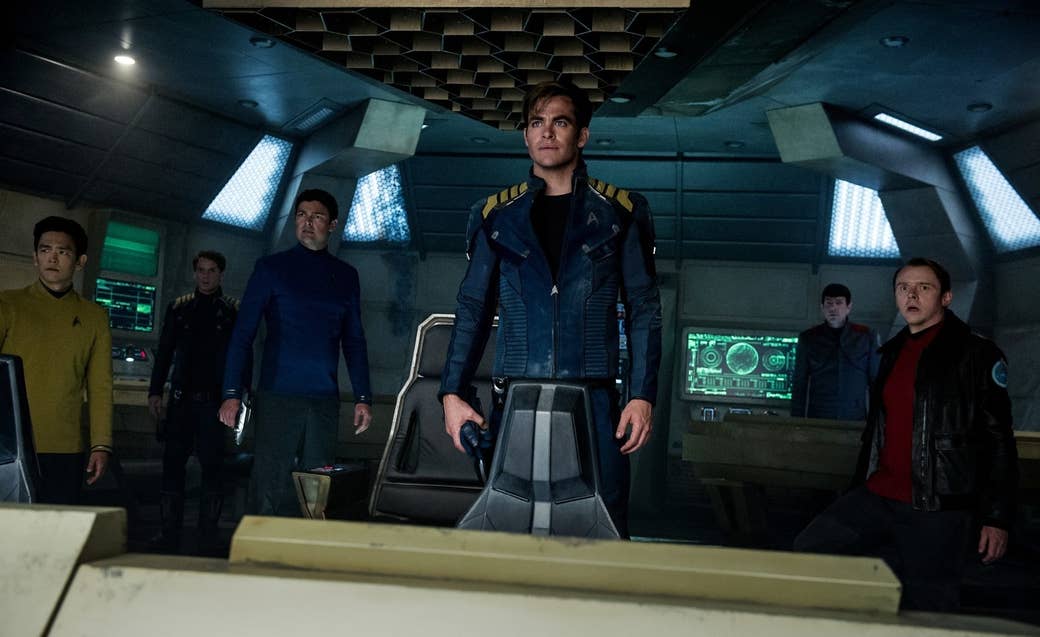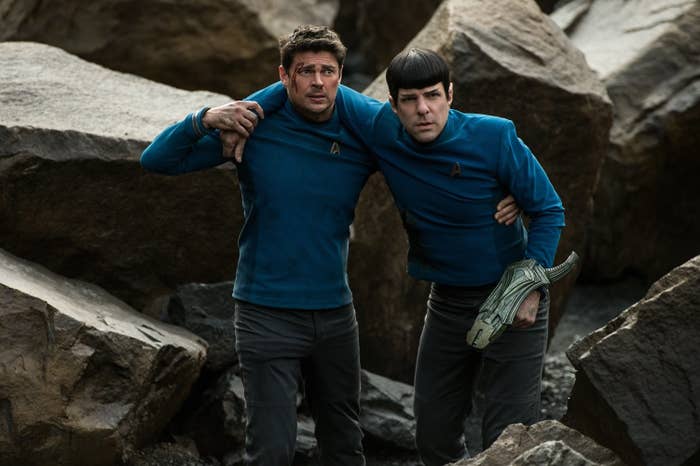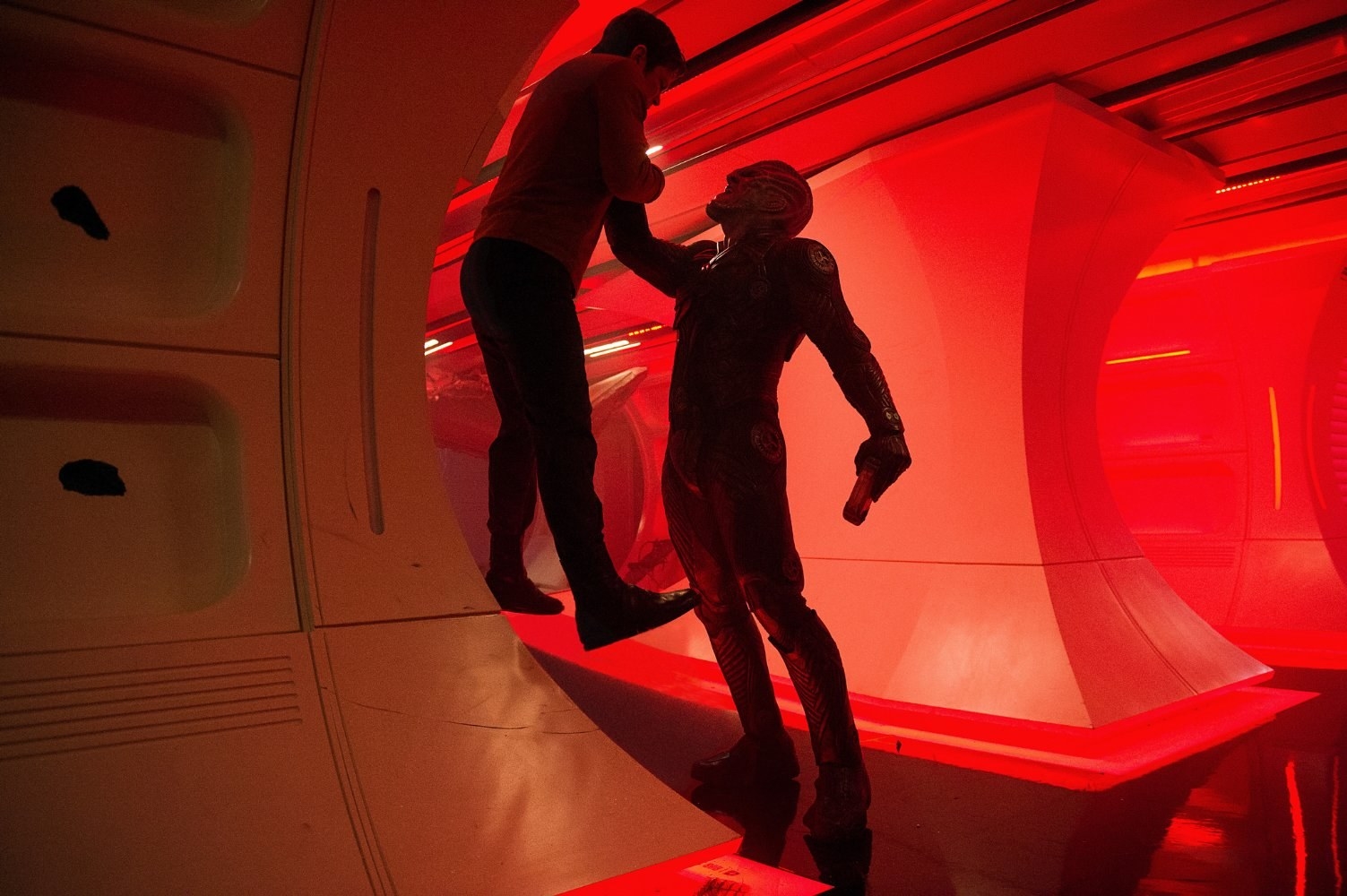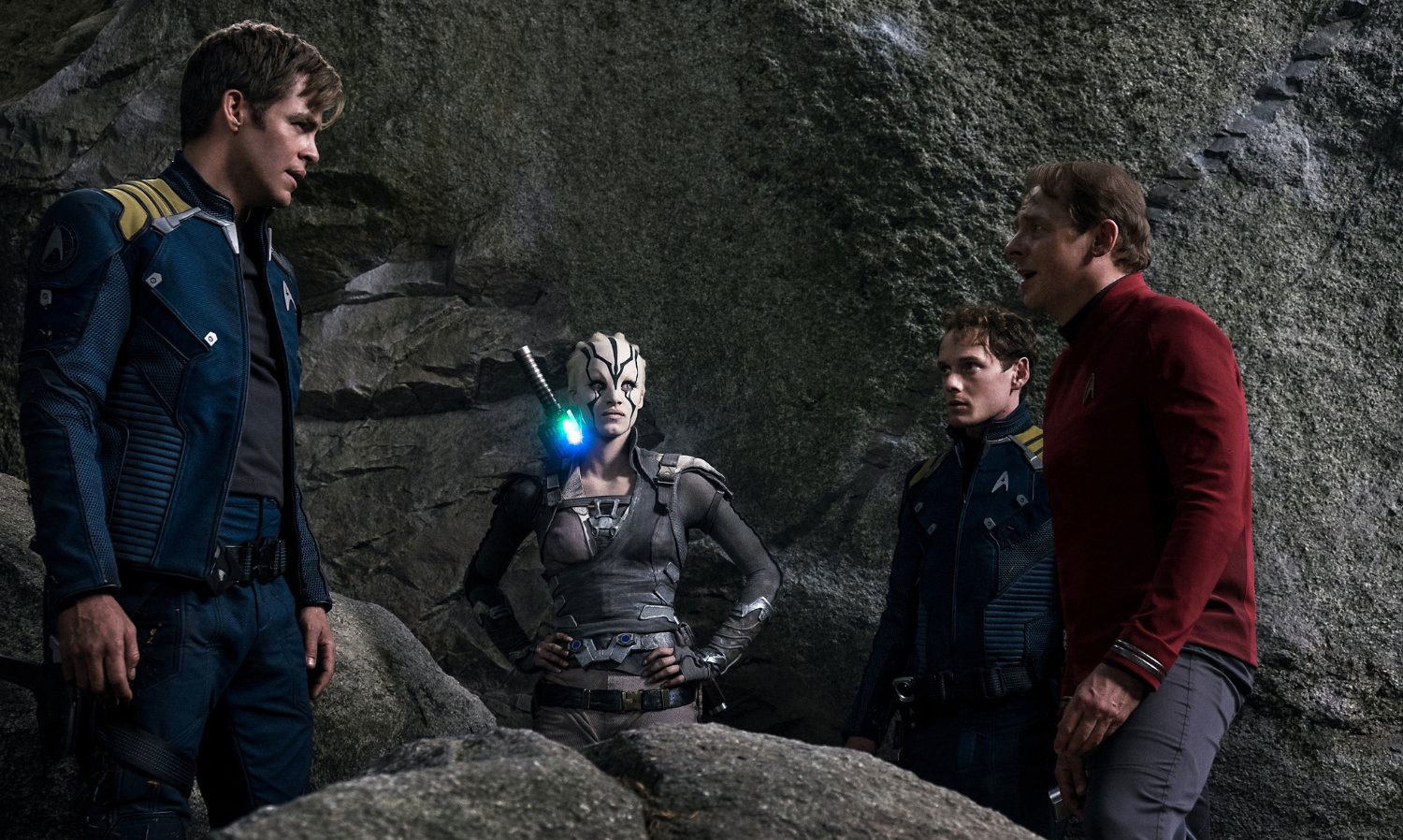
James T. Kirk isn’t satisfied — and it's starting to show.
The Starfleet captain, played with a smirk and a highly expressive flop of hair by Chris Pine, might even be the tiniest bit bored when Star Trek Beyond begins.
The Enterprise is about halfway through a five-year mission of boldly going where no one has gone before, and Kirk has grown restless, starting to wonder if his life is just going to be one colorful space adventure after another. He strolls through the halls of his ship, observing his crew at work and at play, talking about his dead dad over drinks with Bones (Karl Urban) and avoiding sharing his feelings with Spock (Zachary Quinto), who’s experiencing some mid-journey malaise of his own. As Kirk notes in his captain's log voiceover, “Things have started to feel a little…episodic,” which is basically the TV-series-turned-movie-series-and-back-again equivalent of Peggy Lee’s “Is That All There Is?”
Star Trek Beyond isn’t, obviously, all there is to space exploration, or even all there is to the franchise’s 2000s reboot, which will get at least one more installment with its current cast. But it is a movie about Kirk getting his groove back after a distress call into the clutches of a villain named Krall (Idris Elba) and helping his crew to save a starbase/the world. The trouble is, we’ve barely gotten a chance to watch him get that groove on in the first place. Star Trek Beyond is a snappy, diverting affair directed by Justin Lin and written by Doug Jung and star Simon Pegg that nevertheless leaves a lingering feeling, like Kirk, that something’s missing — and that thing is the leisurely time span of television (where Trek is headed, with new characters and under the guidance of Bryan Fuller, in 2017).

Despite the "episodic" dig, Pine’s Kirk has never actually had the luxury of weekly adventures on the small screen. Nor has Zachary Quinto’s Spock, Urban’s Bones, Zoe Saldana’s Uhura, Pegg’s Scotty, John Cho’s Sulu, or the late Anton Yelchin’s Chekov. They're a TV ensemble without a show, and compared to the screen time logged by other Trek crews, they’ve barely managed a blip together. They are characters whose relationships are built on what’s understood to have happened between blockbusters, represented in shorthand in Beyond and its 2013 predecessor Star Trek Into Darkness by the in medias res alien encounters that start both films. When we do spend time with them, they're in crisis mode.
But it’s the downtime in the beginning, and the exchanges that take place when the characters are split up and stuck on a planet hidden away behind a nebula, that are Beyond’s most resonant parts — the parts that feel more like a very expensive episode of TV as opposed to a movie, and the parts that create a sense of the time these folks have spent working and living together.
Lin, taking over directing duties from Star Trek and Star Trek Into Darkness’s J.J. Abrams, is famous for building The Fast and the Furious franchise into the multi-ethnic extravaganza of batshit vehicular set pieces and heartfelt affirmations of family that it is today. And the most memorable big beats in Star Trek Beyond, with the exception of the one that irresistibly repurposes a classic tune for combative ends, are cribbed from Lin's earlier franchise, with characters catching each other midair or leaping off vehicles just as they teeter off cliffs. The rest of the action is disappointingly murky — what should have been a thrilling sequence involving a huge starship chunk is ultimately hard to make out in the dark, and aerial fights hurtling through space don't even offer a sense of where the assailants are in relation to one another.

Star Trek Beyond feels almost reluctant to rev up to its inevitable battle with Krall, whose intriguing backstory is held back too late, making it into a reveal rather than something that could have larger resonances to Kirk’s search for purpose. As the baddie, Elba offers some choice snarls from under layers of prosthetics, but he can’t make Krall anything more than an also-ran, one who is, like Khan in Star Trek Into Darkness, effectively a terrorist. Star Trek Beyond’s themes of turning the peaceful Federation back into a military operation are also recycled from the last installment, as if there needs to be some ideology-rattling threat to justify a movie, which the series has already exhausted anyway. What Beyond proves is that the need to include as much big, mission-questioning action as possible actually gets in the way of what makes Star Trek most pleasurable: how its crew interacts with one another and with alien races, always bridging differences.
The alien newcomer here is named Jaylah, and she’s played by Kingsman’s Sofia Boutella, the henchwoman with the deadly prosthetics. Jaylah is also handy with a weapon, and she speaks adorably distinctive self-taught English. If there are times when she’s reminiscent of the similarly marooned Star Wars: The Force Awakens’ Rey, it has more to do with the limited current template for kickass galdom than any intentional aping. (Less fun is how Uhura fades into the background, as if there’s only room for one prominent female character at a time — and who knows what befell poor Carol Marcus, who gets nary a mention). Mostly, Jaylah is an effective new element off of which Kirk and Spock and the other crew members can bounce, a reminder that the crew is its own sort of mutable family, capable of absorbing new members as well as letting ones go.

For most of its run, though, Beyond keeps Kirk and Spock, Star Trek’s perfectly matched pair of impulsive instinct and cool logic, apart. They are separately grappling with their respective futures, each trying to figure out where he's headed, if it’s time to settle down elsewhere and put down roots. The most satisfying moment in the entire film isn’t a shootout in a spacecraft or a fight in a gravity stream; it’s when Kirk and Spock both arrive at the same understanding, without ever needing to talk it out. After all, why would you ever want to leave the Enterprise, this ship that’s its own patchwork community, hurtling through space toward the unknown? It’s the journey that’s the point, not the destination, and it’s the ongoing experiences in Star Trek that make the franchise, not the big, universe-quaking ones.
